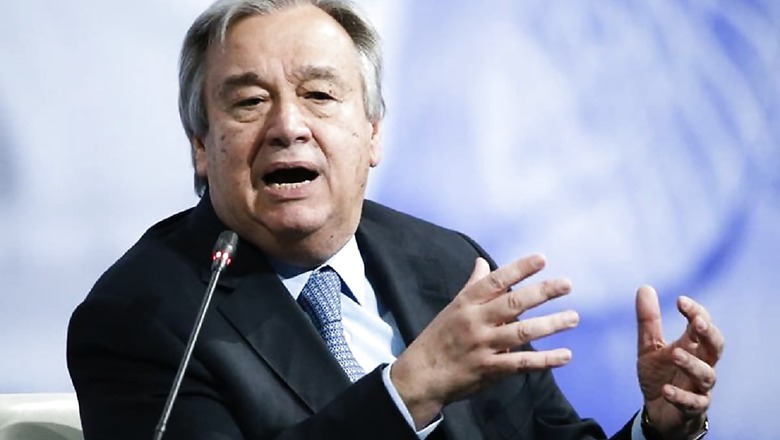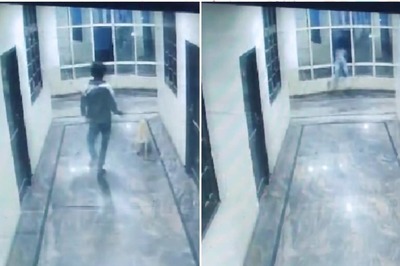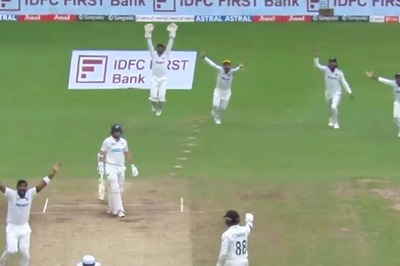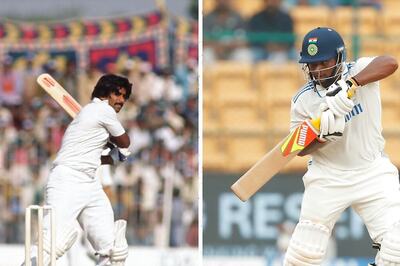
views
Without naming the US and China, UN chief Antonio Guterres warned on Tuesday that the world cannot afford a future where the two largest economies split the globe in a "Great Fracture", as he urged the nations to do everything to avoid a new Cold War. The Secretary-General gave a clarion call for a "collective new push" for peace and reconciliation.
"We need a common international effort – led by the Security Council – to achieve a global ceasefire by the end of this year. We have 100 days. The clock is ticking," he said. "The world needs a global ceasefire to stop all 'hot' conflicts. At the same time, we must do everything to avoid a new Cold War," Guterres said in his address to the high-level 75th session of the UN General Assembly that commenced on Tuesday amid the devastating and ongoing COVID-19 pandemic.
He said that a technological and economic divide risks inevitably turning into a geo-strategic and military divide. "We are moving in a very dangerous direction. Our world cannot afford a future where the two largest economies split the globe in a Great Fracture – each with its own trade and financial rules and internet and artificial intelligence capacities," he said.
"We must avoid this at all costs," he added. While Guterres did not name the US and China, political and economic tensions between Washington and Beijing have escalated due to trade war and the coronavirus, which originated in the Chinese city of Wuhan last year.
US President Donald Trump, who has repeatedly called coronavirus as the 'Chinese Virus', has lambasted China for being "very secretive" in sharing information on its coronavirus outbreak that will soon claim over a million lives globally, asserting that the US and the world would have been better prepared if Beijing gave an "advance warning" about the impending crisis. Unlike in the last 75 years, the UN Secretary-General was addressing a sparsely-filled General Assembly hall as the annual high-level segment switched to a virtual edition in the wake of the pandemic.
Guterres was flanked by President of the 75th session of General Assembly Volkan Bozkir, but the sprawling General Assembly hall was not packed with world leaders or ministers. Only UN ambassadors from Member States were in the hall, maintaining social distance and wearing masks. Heads of State and Government will be making their national statements through pre-recorded video statements, a first in the 75-year history of the UN.
"In a world turned upside down, this General Assembly Hall is among the strangest sights of all. The COVID-19 pandemic has changed our annual meeting beyond recognition. But it has made it more important than ever," the UN chief said. Guterres said in January while addressing the General Assembly that he had identified "four horsemen" – four threats that endanger the world's future – the highest global geostrategic tensions in years, existential climate crisis, deep and growing global mistrust, and the dark side of the digital world.
"But a fifth horseman was lurking in the shadows. Since January, the COVID-19 pandemic has galloped across the globe – joining the four other horsemen and adding to the fury of each," he said on Tuesday. Guterres asserted that the pandemic was the kind of crisis that the world will see in different forms again and again.
"COVID-19 is not only a wake-up call, it is a dress rehearsal for the world of challenges to come," he said. As the pandemic spread across the world, Guterres made a global appeal for a ceasefire.
"Today, I appeal for a new push by the international community to make this a reality by the end of this year. We have exactly 100 days," he said. However, the UN chief said in areas where terrorist groups are particularly active, the obstacles to peace will be much more difficult to overcome.
"I am particularly concerned that terrorist and violent extremist groups will exploit the pandemic. And we must not forget the dramatic humanitarian cost of war," he said, adding that in many places, the pandemic coupled with conflict and disruption is dealing crippling blows to food security.
















Comments
0 comment